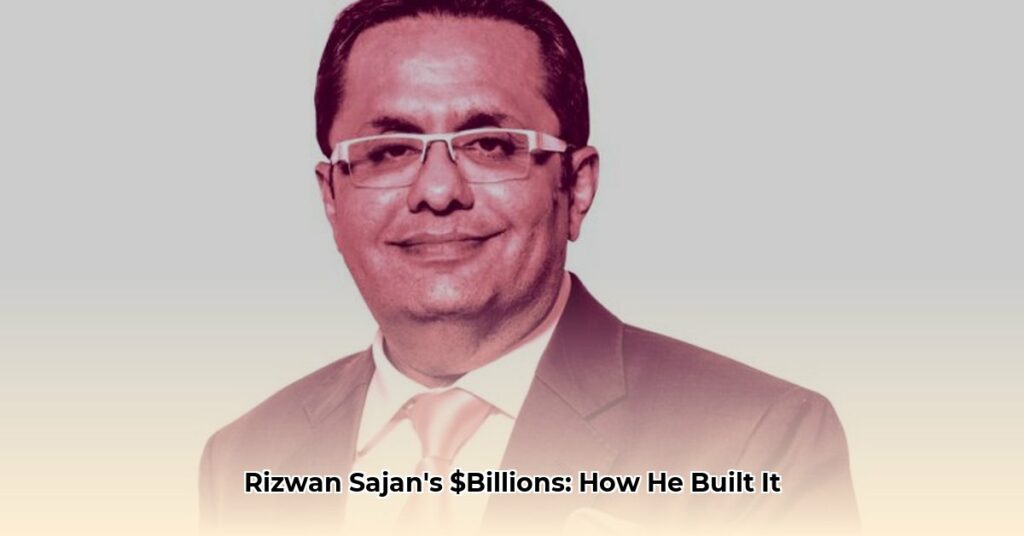From Mumbai Streets to Dubai Skyscrapers: Rizwan Sajan’s Rise
Rizwan Sajan, chairman of the Danube Group, is a prominent figure in Dubai’s bustling business landscape. His estimated net worth, often cited between $1.5 billion and $2.5 billion, places him among the wealthiest individuals in the UAE. But how did this former stationery salesman from Mumbai amass such a fortune? This article delves into Sajan’s journey, exploring his entrepreneurial drive, the growth of his empire, and the impact he’s had on the region.
Building the Danube Empire: Brick by Brick
Born in Mumbai in 1963, Sajan’s early life was marked by financial hardship. Leaving school at 16 due to family circumstances, he began his career selling goods on the streets, fostering a resilient spirit and a keen sense for business. This early exposure to commerce likely laid the groundwork for his future ventures. He later moved to Kuwait for work but returned to Mumbai after the Iraqi invasion. In 1993, he arrived in Dubai, a city brimming with opportunity, and founded the Danube Group.
Initially a small building materials trading company, Danube quickly expanded under Sajan’s leadership. He diversified into various sectors, including home décor with Danube Home, aluminum composite panels with Alucopanel, and real estate development. This strategic diversification likely mitigated risk and allowed the company to capitalize on multiple growth areas within the burgeoning UAE market. A key innovation was Sajan’s “1% plan,” a revolutionary approach to real estate that allowed buyers to purchase luxury apartments with minimal down payments. This move likely democratized access to Dubai’s property market, fueling Danube’s growth and solidifying Sajan’s reputation as an innovator. Today, the Danube Group boasts a diverse portfolio, partnerships with high-end brands like Aston Martin and Tonino Lamborghini Casa, and an annual turnover exceeding $2 billion.
Deciphering the Billions: Sajan’s Net Worth
While Sajan’s net worth is widely estimated in the billions, the precise figure remains elusive due to the private nature of his business holdings. The $1.5 to $2.5 billion range likely reflects valuations based on the Danube Group’s performance and market presence. However, there are challenges associated with such estimates, as private company valuations aren’t always transparent.
Factors influencing Sajan’s wealth likely include his significant ownership stake in the Danube Group, along with potential investments in other ventures. The company’s continued growth, expansion into new markets, and successful partnerships suggest that his net worth may continue to rise. However, it’s important to note that economic fluctuations and market changes can impact these estimations.
Beyond the Bottom Line: Leadership, Philanthropy, and Legacy
Sajan’s leadership style has been instrumental in the Danube Group’s success. He emphasizes employee empowerment, delegates responsibility, and fosters a culture of innovation. He also prioritizes internal promotions, which likely contributes to employee loyalty and strong institutional knowledge. Moreover, his commitment to fair compensation and employee well-being suggests he understands the importance of investing in his workforce.
Sajan is also known for his philanthropic activities, including the Danube Welfare Centre, reflecting a commitment to social responsibility and giving back to the community. His son, Adel Sajan, serves as Group Managing Director, suggesting a focus on succession planning and the long-term future of the family business.
The Future of the Danube Dynasty
Looking ahead, the Danube Group appears well-positioned for continued growth under Sajan’s guidance. His entrepreneurial vision, combined with his son’s involvement, suggests a focus on innovation and expansion. While challenges undoubtedly exist, Sajan’s track record of resilience and adaptability indicates a capacity to navigate future uncertainties. His legacy is not just one of financial success but also of entrepreneurial vision and a commitment to community impact. It will be intriguing to see how he continues to shape the business landscape in the years to come.
Delving Deeper: Understanding Sajan’s Strategies
Sajan’s success can be attributed to a combination of shrewd business acumen, adaptable strategies, and a deep understanding of the market. The “1% plan”, for instance, was a game-changer in the Dubai real estate scene. By reducing the barrier to entry for luxury apartment ownership, Sajan tapped into a vast, underserved market. This suggests a strategic approach of understanding customer needs and tailoring offerings to meet those needs.
His ability to navigate economic downturns also played a crucial role. During the Gulf War and subsequent financial crises, Sajan probably made difficult but necessary decisions to ensure the survival and eventual resurgence of his business. This suggests resilience and a willingness to adapt strategies during challenging times.
Furthermore, Sajan’s emphasis on diversification has likely mitigated risk and broadened the Danube Group’s revenue streams. By venturing into different sectors, from building materials to home décor and real estate development, he created a synergistic ecosystem within his business empire. This suggests a forward-thinking approach and an understanding of portfolio management.
Sajan’s leadership philosophy also likely contributes to his success. By empowering his employees, fostering a positive work environment, and promoting from within, he has likely cultivated a loyal and dedicated workforce. This approach suggests an understanding of the importance of human capital in driving business success.
While Sajan’s success is remarkable, it’s important to acknowledge the role of external factors. The booming Dubai economy, coupled with the city’s focus on development and construction, provided a fertile ground for the Danube Group to flourish. Sajan’s ability to recognize and capitalize on these opportunities was key to his success. Further research into Sajan’s decision-making processes, risk assessment strategies, and market analysis techniques could provide a deeper understanding of his entrepreneurial journey.



